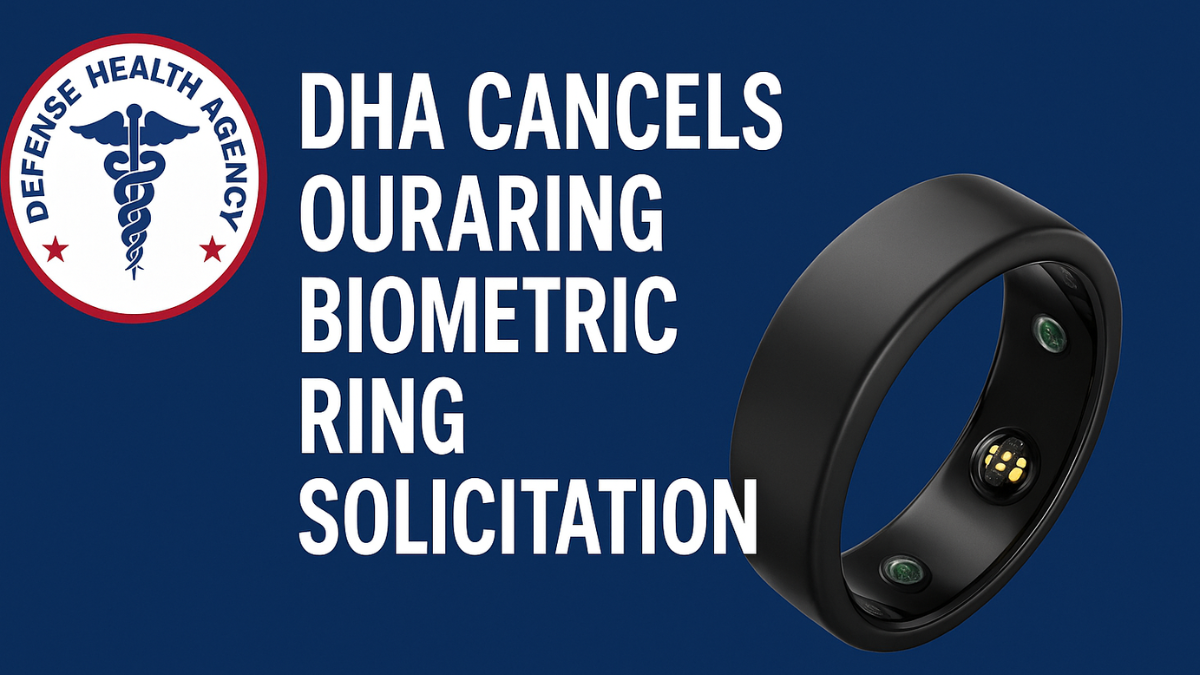In a significant shift within the military health technology space, the Defense Health Agency (DHA) recently announced the cancellation of its solicitation for OuraRing biometric rings. This decision has sparked wide-ranging discussions in both defense and digital health circles. The use of wearable technology like the OuraRing was expected to play a crucial role in monitoring soldier health, stress, and readiness in real-time. The sudden cancellation prompts several questions: Why was it canceled? What are the implications? And what does it mean for the future of biometric monitoring in defense?
also read: https://usaenliinea.com/ketchum-meaning/
This detailed article explores the rationale behind the move, its consequences, and what lies ahead for biometric health tools in the U.S. military.
Understanding the Context: What Was the OuraRing Biometric Ring Solicitation?
Before diving into the implications of the cancellation, it’s important to understand what the original solicitation involved. The Defense Health Agency was exploring the acquisition of OuraRing, a biometric smart ring known for its ability to monitor various health metrics, including:
- Heart rate
- Respiratory rate
- Body temperature
- Sleep quality
- Activity levels
OuraRing has gained popularity among athletes, corporate professionals, and wellness enthusiasts. The military’s interest in such a device was logical—it would allow non-invasive, real-time monitoring of soldiers’ physical and mental health, potentially reducing risk and enhancing readiness.
Why Was It Significant?
Incorporating such technology was a step toward digital transformation in military healthcare. The use of commercial-off-the-shelf (COTS) wearables like the OuraRing could help monitor stress levels, fatigue, sleep deprivation, and other performance-impacting conditions. This information would be especially useful in high-stress or deployed environments.
Why Did the DHA Cancel the OuraRing Biometric Ring Solicitation?
The official statement by the DHA provided limited details, simply stating the solicitation was canceled in the best interest of the government. However, industry experts and defense analysts have proposed several plausible reasons behind the decision.
1. Data Security and Privacy Concerns
One of the biggest concerns with any biometric device—especially in a defense context—is data sovereignty and privacy. The OuraRing collects sensitive physiological data that might raise security red flags, especially when integrated into DoD systems. Even if the data is encrypted, ensuring it does not fall into the wrong hands is a constant concern in military cybersecurity.
2. Vendor Lock-In and Proprietary Technology
The OuraRing is a proprietary device developed by Oura Health Ltd., a private company. If the DHA moved forward with this device, it could face vendor lock-in, making future integrations or replacements difficult or costly. The DoD may have chosen to avoid dependency on a single commercial product.
3. Cost and Budgetary Restraints
Cost-effectiveness is always a consideration. Even though OuraRing is relatively affordable for individual use, scaling it for thousands of military personnel could represent a significant investment. Add in maintenance, data storage, cybersecurity infrastructure, and training costs—it becomes a major budget line item.
4. Efficacy and Clinical Validation
While OuraRing has shown promising health monitoring capabilities, it may not meet military-grade standards for reliability and accuracy under extreme conditions. The DHA might have concluded that more testing or different technology was needed.
What Are the Implications of the Cancellation?
The decision by the DHA to cancel the OuraRing biometric ring solicitation sends ripples across multiple dimensions of defense and health tech policy.
A. Shift in Military Health Tech Strategy
This may indicate a strategic pivot away from consumer-grade wearables toward military-specific health technologies. Tools developed specifically for the unique demands of combat and field conditions may now be prioritized.
B. Slowdown in Adoption of Commercial Wearables
The military has been testing a variety of commercial wearables in recent years. This cancellation could slow down the momentum, making agencies more cautious about adopting off-the-shelf biometric tech.
C. Focus on Interoperability and Open Platforms
This also highlights the need for interoperable, secure, and customizable platforms that can integrate easily with DoD systems. The cancellation might pave the way for the development or adoption of open-source biometric solutions.
Comparing OuraRing to Other Biometric Devices
To better understand the context of DHA’s decision, here’s a comparative table showing how the OuraRing stacks up against other popular wearable devices.
| Feature | OuraRing | Fitbit Charge 6 | WHOOP Strap 4.0 | Garmin Fenix 7 |
|---|---|---|---|---|
| Form Factor | Ring | Wristband | Wristband | Watch |
| Battery Life | 4-7 days | Up to 7 days | 4-5 days | 11-18 days |
| Sleep Tracking | Advanced | Basic | Advanced | Moderate |
| Stress Monitoring | Yes | Yes | Yes | Yes |
| Cloud Data Storage | Proprietary Cloud | Google Cloud | WHOOP Cloud | Garmin Connect |
| Government Approved | No | No | No | Some models (limited) |
From the table, it’s clear that while OuraRing offers unique insights in a small form factor, it’s not the only device in the space—and none have been officially approved for government-wide deployment in military operations.
What Comes Next for the DHA?
Although the DHA cancels OuraRing biometric ring solicitation, it does not mean the end of wearable tech in the military. Instead, the agency might now:
- Develop in-house wearable technologies with higher security and interoperability.
- Partner with DoD-affiliated research institutions like DARPA or the U.S. Army Research Laboratory.
- Focus on pilot programs to test ruggedized and military-optimized health monitoring tools.
Moreover, the cancellation opens the door for a re-evaluation of requirements, potentially leading to better, more secure solutions that align with long-term defense health goals.
Potential Future Alternatives for the DHA
Here are some wearable and biometric technologies that the DHA might explore as alternatives:
- Epidermal Wearables (e-tattoos) – These are ultra-thin patches that monitor health metrics and transmit data securely.
- Smart Uniforms – Clothing embedded with sensors to track movement, temperature, hydration, and fatigue.
- Augmented Reality (AR) Headsets with Biometric Scanners – Combining heads-up display with health tracking for real-time alerts.
- Smart Insoles – Devices embedded in boots to detect posture, gait, and fatigue in soldiers.
These alternatives reflect a broader movement towards context-aware and mission-adaptive technologies that blend seamlessly into military life.
FAQs
- Was the OuraRing ever deployed in a live military operation?
No, it was under consideration and testing but never fully deployed in an operational capacity. - Can soldiers still use OuraRing privately while in service?
Yes, there is no restriction on personal use, but it may not be integrated with military systems. - Is this the first time DHA has canceled a solicitation for wearable tech?
No, previous solicitations have been canceled due to budget, security, or technical limitations. - What is biometric solicitation in military terms?
It refers to government procurement efforts to acquire biometric tools for health or identification purposes. - Did Oura Health respond to the cancellation?
As of now, there has been no public response from the company. - How was the data to be managed if OuraRing was deployed?
The plan involved cloud-based storage, which raised data sovereignty concerns. - Are there any other biometric ring brands considered by the military?
Other rings like Motiv or Ultrahuman may be evaluated in the future, but none are approved yet. - Could AI-based biometric analysis tools replace wearables?
AI is being explored, but hardware still plays a key role in real-time data collection. - Does the cancellation affect civilian healthcare plans involving OuraRing?
No, this decision is specific to the DHA and military application. - Will there be a new solicitation issued by DHA for a similar product?
It’s possible, especially if better security and customization options are developed.
Conclusion
The news that the DHA cancels OuraRing biometric ring solicitation reflects the complexity of integrating commercial health tech into a highly sensitive military environment. While OuraRing offers impressive capabilities, concerns around data privacy, vendor lock-in, and operational fit likely played a role in the DHA’s decision.
This move does not signal a step back from digital health innovation but rather a strategic reassessment of the best ways to integrate biometric tools securely and effectively. With new developments in wearable technology and defense-grade biometrics on the horizon, the future of military health monitoring remains promising—just with a stronger focus on security, customization, and strategic fit.
also read: https://usaenliinea.com/skinpres-t/
also read: https://usaenliinea.com/hcooch-ch2-h2o/
also read: https://usaenliinea.com/doge-hhs-migrant-housing-contract/
also read:https://usaenliinea.com/united-airlines-flight-ua770-emergency-diversion/
also read: https://usaenliinea.com/explore-famousparentingg-com-a-complete-guide-to-trusted-parenting-advice/
also read: https://usaenliinea.com/vidmattapp-the-ultimate-guide-to-downloading-and-enjoying-videos-offline/
also read:https://usaenliinea.com/nhentai-het/







